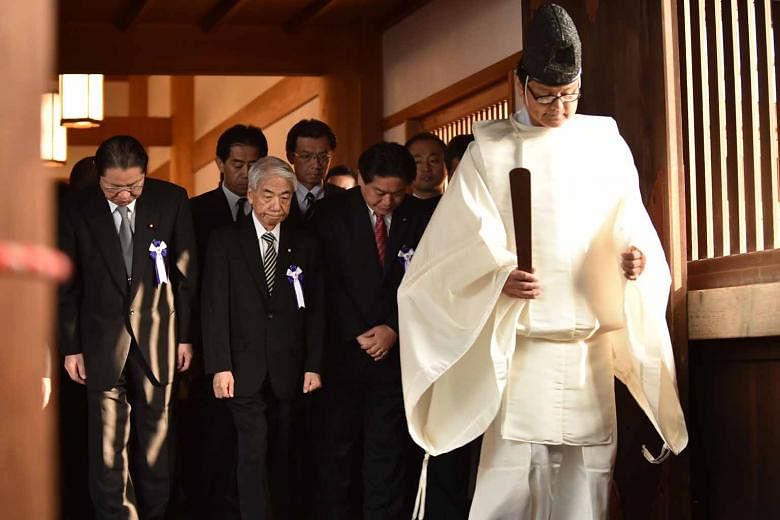SEOUL • The defence ministers of South Korea and Japan held talks in Seoul yesterday, in a further sign that relations are beginning to emerge from an extended diplomatic deep freeze.
But amid the cautious rekindling of ties, scores of Japanese lawmakers visited Tokyo's Yasukuni war shrine yesterday, threatening to upset the atmosphere. The group of 73 politicians and 96 representatives of other lawmakers went to the leafy shrine to mark the autumn festival, ahead of trilateral talks among China, Japan and South Korea expected in two weeks' time.
Coming so close to the talks, the visit to the shrine could anger South Korea and China, which see it as a symbol of Tokyo's militarist past. On Monday, Prime Minister Shinzo Abe sent a ritual offering to the shrine in a private capacity, which provoked sharp remarks from China and South Korea that he was wrong to do so.
The Tokyo shrine honours millions of Japan's war dead, but also controversially includes several senior military and political figures convicted of war crimes. An attached museum portrays Japan more as a victim of American aggression in World War II and makes scant reference to the extreme brutality of invading Imperial troops when they stormed through Asia.
Yesterday's meeting between South Korea's Mr Han Min Koo and his Japanese counterpart Gen Nakatani was the first time a Japanese defence minister has travelled to Seoul in nearly five years. The two men last met in Singapore in May for what was the first bilateral defence ministry dialogue in four years.
The defence meeting marked the latest in a series of steps the two sides have taken towards a tentative public rapprochement, although military cooperation was never suspended even when ties were at their lowest ebb. Mr Nakatani was expected to brief Mr Han on the recent passage of new laws broadening the role of the Japanese military - legislation that has caused some consternation in Seoul.
The contentious security Bills could allow Japanese troops to engage in combat overseas for the first time since the end of World War II.
The thaw in ties comes as South Korean President Park Geun Hye and Mr Abe are scheduled to meet in Seoul for a trilateral leadership dialogue also involving Chinese Premier Li Keqiang. Such three-way meetings, initiated in 2008, were held annually until 2012 when they were suspended after Seoul-Tokyo relations went into one of their regular tailspins.
During her recent visit to the United States, Ms Park had suggested she would be open to sitting down one-on-one with Mr Abe on the sidelines of the trilateral summit.
Since taking office in February 2013, she has refused to meet Mr Abe, arguing that Tokyo has yet to properly atone for abuses during the colonial period. Washington has been nudging its two key Asian military allies to overcome grievances over the past and focus together on containing an increasingly assertive China.
AGENCE FRANCE-PRESSE

